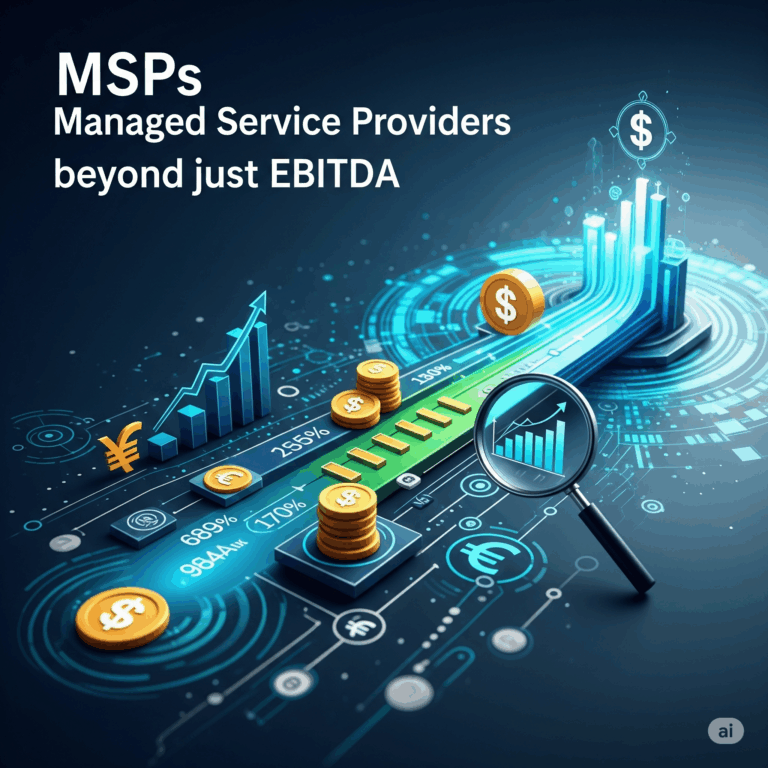Business Valuation Terms
EBITDA (Earnings Before Interest, Taxes, Depreciation, and Amortization):
- EBITDA = Net Income + Interest + Taxes + Depreciation + Amortization
- EBITDA is a financial metric that represents a company’s operating performance by measuring its profitability from core operations, without considering the effects of capital structure, tax environment, and non-cash accounting items. It is perhaps the single most important metric acquirers use to value a Managed Service Provider (MSP).
- EBITDA is calculated by taking a company’s net income and adding back interest expenses, taxes, depreciation, and amortization. After determining this Unadjusted EBITDA, you can then add back one-time expenses (legal settlements, owner’s personal expenses, etc.) and subtract non-recurring income (sale of assets, insurance claims, income from customers that have left the business, etc.) to get your Adjusted EBITDA. This Adjusted EBITDA provides a more accurate and consistent view of a company’s operational performance and is the number which acquirers will use to value your business.
MULTIPLE:
- A multiple is a financial ratio used to value a company by comparing its financial metrics (like revenue or EBITDA) to the purchase price or market value. Multiples are commonly used in M&A to quickly assess whether a deal is fair compared to other similar transactions or industry standards.
- While some MSSPs may trade off of revenue multiples, MSPs are almost always valued based on EBITDA multiples. For example, if you have an Adjusted EBITDA of $1M and sell for a 6x Multiple, the total sale price would be $6M.
RECURRING REVENUE:
- Recurring revenue comes from customers who are billed on a consistent schedule, such as monthly or annually, often through subscription models, service contracts, or retainers. Recurring revenue is predictable, stable, and expected to continue regularly over time. The more contractually recurring revenue, the higher multiple you can get for your MSP.
- This is different from Reoccurring Revenue, which is revenue that happens repeatedly but is not necessarily on a consistent, predictable schedule. Clients whom you have served for years without a contract would fall into the Reoccurring Revenue bucket.
Deal Process Terms
NDA (Non-Disclosure Agreement):
- A legally binding contract that establishes a confidential relationship between two or more parties. The primary purpose of an NDA is to protect sensitive information shared between the parties from being disclosed to unauthorized third parties. Sellers and buyers sign an NDA prior to sharing any exports of financial data or customer information.
WORKING CAPITAL:
- Working Capital = Current Assets – Current Liabilities
- A Working Capital Peg is agreed to during negotiations. This target is based on historical data and represents the average working capital needed to maintain normal business operations. If the closing working capital is above or below the target working capital, an adjustment is made to the purchase price. If it’s below the target, the purchase price is reduced, and if it’s above, the purchase price can increase. Agreeing to a fair working capital figure prevents seasonal and other fluctuations from unfairly benefiting either side of the transaction.
LOI (Letter of Intent):
- An LOI is a non-binding document that outlines the preliminary terms and conditions of a potential transaction, such as a merger or acquisition. It serves as a framework for negotiations, detailing key points like the purchase price, structure of the deal, and timeline, while also allowing both parties to conduct due diligence before finalizing the agreement. Although non-binding, an LOI often includes binding provisions related to confidentiality, exclusivity, and governing law. Buyers and sellers sign an LOI prior to diligence to indicate their intent to enter into a deal at the outlined price and terms.
DILIGENCE:
- Due diligence is the comprehensive appraisal and investigation process conducted by a buyer to assess the financial, operational, legal, and commercial aspects of an MSP before completing the transaction. It involves verifying the accuracy of information, identifying risks, and evaluating the overall viability of the deal to ensure that the buyer makes an informed decision.
QoE (Quality of Earnings):
- A QoE is a crucial part of the due diligence process in any deal. It involves a detailed review of the MSP’s financial statements to assess the sustainability, accuracy, and reliability of its earnings. The goal is to understand how much of the reported earnings are recurring, stable, and likely to continue post-transaction, versus earnings that may be one-time or non-operational. This assessment is typically done by an outside accounting firm and can be compared to an audit for your business.
CLOSING:
- Closing is the final stage in a transaction where all the agreed-upon terms are executed. This involves the transfer of ownership, payment of the purchase price, signing of final legal documents, and completion of all necessary conditions. Once closing occurs, the buyer formally takes control of the target company, and the transaction is considered complete.
For more insights or to have a conversation about your business, contact Charlie at [email protected].




